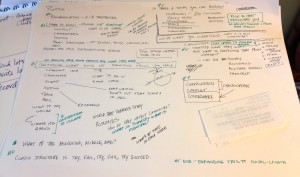Hence this story of two cultures clashing, and both the gender norms and the norms around the sex act are getting tangled up in interesting ways.
Anyhow, this is currently the story’s beginning (and is a good candidate to remain the beginning):
“It can’t be avoided, Tom,” Gayathri said to her spouse. “I know it’s Age-Come for Suzette and Bit, but they must deal with an outsider visiting. To keep Grace, they must be taken in by one of the Lines, and everyone else is dealing with emergencies right now. i can’t create a diplomatic incident over the feelings of two family members. They must learn to adapt.”
“It’s not the quarters that’s a problem,” they grumbled. “Since Bethany and Besa moved over to their new Line, we’ve had extra. But Gaya, this means adjusting all my meal planning.”
“A few more servings here and there”¦”
“Individualized cakes with names on them for the party, for one,” they said. “And the centerpiece was a fondant scene of the family. Now how will I incorporate them?”
“I’ll send you a couple of images from her press kit. Dress her in scarlet, that’s the Corps color for women.”
They frowned at her. “They dress in different colors? What do they do about in-betweeners or asexuals?”
“The Corps doesn’t allow them.”
They rolled their eyes. “One of those.” They eyed her. Her own insistence on keeping the same gender without ever attempting other forms or sexualities was a sore point in the relationship. While not unknown, it was eccentric enough that Tom found it embarrassing.
“A wealthy one of those, with money to invest on the behalf of her coalition. You will be nice.”
In the end the tiny fondant image of the Gräfin was easy enough. A little twiddling let Tom print a sugar face, which they affixed with a dab of icing. They’d been working on faces for the family members for a month: seven generations would be represented, which they privately thought a poor showing, but Gaya’s family was so much newer than the one they’d married out of. And cooking for that family on such an occasion had been making food for several hundred. Tom might have had more help in their family of origin, but there would have been considerably more work.
Still, the loss of Bethany, the most interested in kitchen work, had grated on them. Bethany had known how to help, how to clean up after Tom as they moved through the kitchen as well as how to supply whatever it was that was needed, prepping the mutual mise en place to perfection. And the pair known each other’s depth of perception, could tease each other with tastes, ask advice on building a sauce that reached past acid and sweet to take on other notes and textures.
They tapped air bubbles out and tamped the face down with a toothpick, then set it in the diorama to one side, clearly an onlooker. They relented and moved it a few inches further in. The poor woman couldn’t help it that she came at an odd time.
The diorama sprawled, a meter in diameter, on the kitchen’s center counter. They circled it, looking it over in the lime-tinted sunlight cast through the rear windows that overlooked slopes of garden leading down to the lake, an expanse that would have swallowed the massive house entire without a thought, its surface glutted with water-lilies.
In a week the swollen cream-colored heads would burst into blossoms, soft explosions that would happen as dusk settled, while the nightbirds sang, and the children would have an Age-Come that let them step into new roles and responsibilities if they chose. Sometimes children decided they did not want it yet and retreated. Tom didn’t think Bi would. They had borne the baby, carried it within their body till birthing time, and that gave the two of them a special knowledge of each other. Suzette had come into the family as a baby when one of their parents had married in, and the affection Tom held for them was the same as that towards most of the two dozen children: pride and affection, but perhaps not to the same fierce degree they experienced when teaching Bit “” not cooking skills, to their chagrin, since the child expressed no interest, but other basics, like how to tie a knot or do daily chores.
Tom had been expecting them for a while, but they came late to breakfast and inspected the diorama dutifully, without focus or remark, before sitting down.
Turning from the heat counter, Tom slid a plate of pancakes in front of the child, who inspected it with the same lack of interest the diorama had evoked.
Jitters. “Having second thoughts? Should I move your figure to the sidelines? You wouldn’t be the first.”
A headshake in reply. You try not to press them, let them grow at their own pace, but they do it to themselves. “It’s only one change, one of plenty in your life. Take it at your own pace, however you like.”





 Here’s something from the current piece. For fellow West Seattleites, the coffee shop in question is indeed the Admiral Bird. This is a sequel to “The Wizards of West Seattle,” which is available in
Here’s something from the current piece. For fellow West Seattleites, the coffee shop in question is indeed the Admiral Bird. This is a sequel to “The Wizards of West Seattle,” which is available in 



9 Responses
I hope you realize your friend was quoting Samuel Goldwyn. Unless you were friends with Samuel Goldwyn, in which case your caption is awesome.
Yeah, blogging is pretty separate from writing. Also, I feel like lots of successful writer blogs are read more by people who came to the blog from the writing. Even in those cases, it does seem like a good way to keep in touch with your super fans. But not necessary. Certainly not more necessary than writing good books.
Thank you for this. I find blogging to be an unpleasant activity and would rather write novels or communicate on Twitter. I just joined an author’s group that keeps harping on the “All writers need to blog to grow your platform!” thing. It was starting to get to me.
If you find it unpleasant, that’s going to show through in the posts, I think. It’s best to focus efforts on the things you feel enthusiastic about and enjoy, at least as much as that is possible.
Not to mention the platform that comes from writing about writing is all writers and not a general audience.
That’s an excellent point.